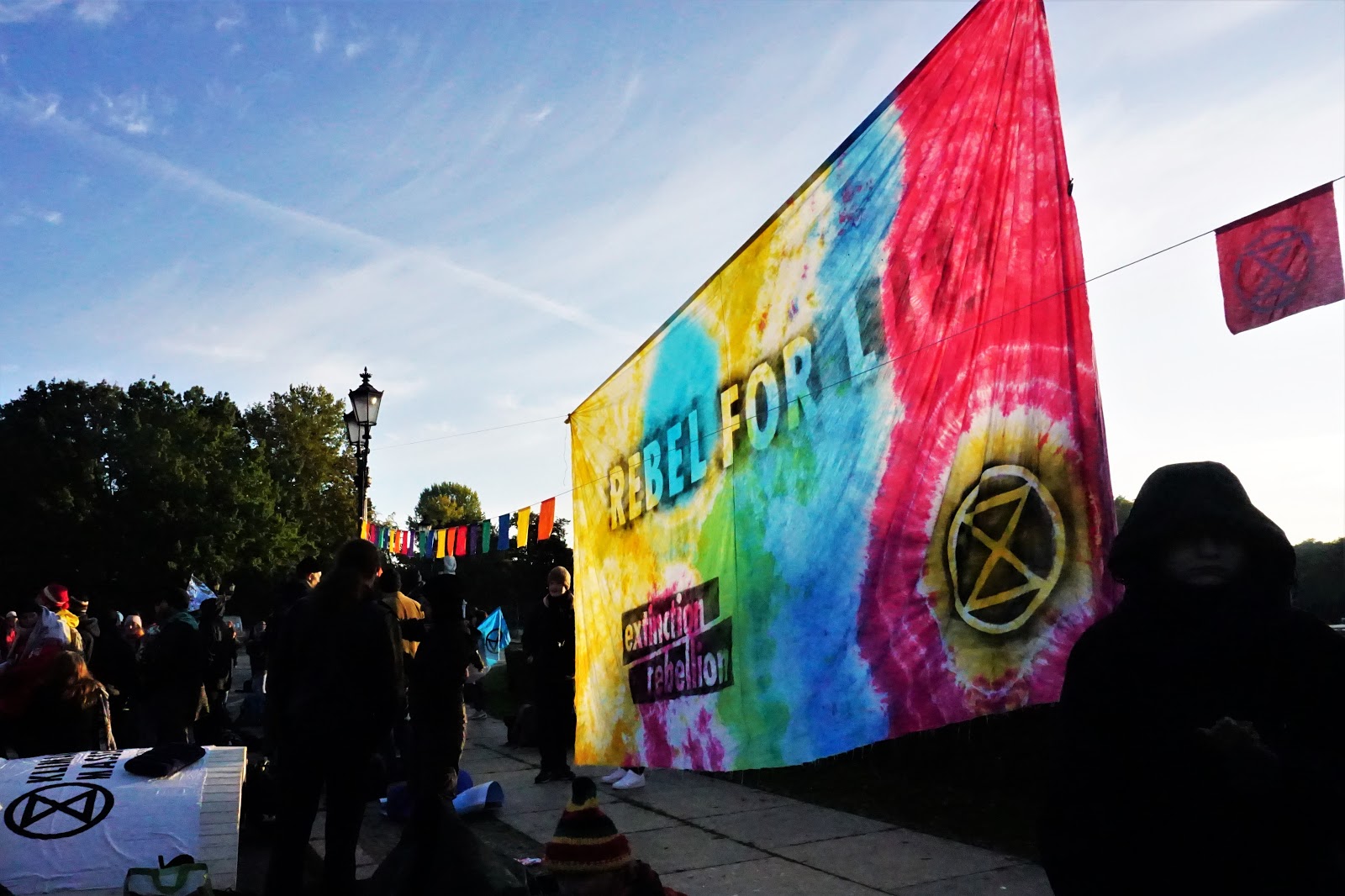It is not even 3 a.m. as the first activists leave their tents getting ready to establish the blockade at the Großer Stern (Great Star) roundabout not far from Extinction Rebellion’s (XR) climate camp in Berlin. In the following week there will be blockades on streets and bridges, glue-ons and lock-ons at ministries, the governing Christian Democrats’ (CDU) headquarters and Vattenfall to protest against inaction, or at least insufficient action, against climate change. At the roundabout, what is to become a small arch later in the day is guarded by the police who don’t want the climate activists to build their symbol of climate justice on the street, and by protesters who fear the police might confiscate their building blocks. Some of them, forming a human chain around the disassembled arch, have locked their arms onto metal pipes from which only they can free themselves without destroying the tube. “It feels a bit like being crucified”, jokes one of them, his breath rising up in clouds made orange by the street lights.
Throughout the morning more activists arrive at the blockade at the Großer Stern that will last for 58 hours is accompanied by more actions throughout the city including swarmings and the occupation of Potsdamer Platz, which the police soon tries to disband. Yet at 10 p.m. a mic-check at the Großer Stern, where the activists get ready to be moved but are willing to keep up the blockade, announces: “The police at Potsdamer Platz has given up. Tonight it belongs to us!”
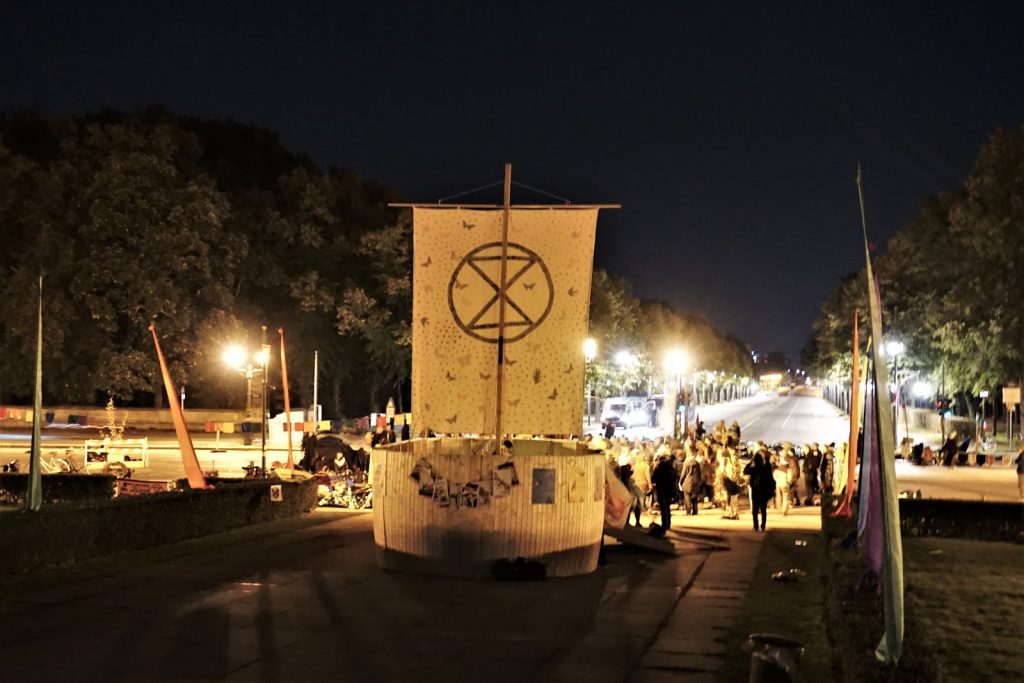
October 9, sees several bridges occupied for several hours for up to two days. Throughout the week there are protests, glue-ons at several ministries and at the CDU headquarters, swarmings and other actions including a picnic organised by XR Youth. Meanwhile, similar actions happen in many other major cities, and around 40 cities, including Stockholm, declare climate emergency.
Horror
But why did all these activists come to Berlin? Arriving from all over Germany and as far away as the Nordic countries, including a delegation from Skåne and more than 200 Swedish activists, prepared to camp for a week and sleep on roads under the open sky, some of them willing to be taken into custody… What is it that drives them to take to the streets? “I fear many environmental catastrophes and that we will have a great deal of flooding, just as it has happened in the last few years. And then, on the other side, that in the really dry countries things start to burn because it is way too dry”, explains Lili, a young activist from Saarland. And her horror scenario for what the future holds is shared by others.
“My horror scenario is just the eco system collapsing, all the animals dying and we’re dying, too. But my absolute horror scenario would be that we could survive but no one else. Everything would be sterile and the world would be dead and we’re just walking around like prisoners”, Elsa from XR Skåne says. To which Sasha adds that social collapse will follow ecological collapse: “A lot of people are starving and then just rich white men oppressing everyone even more than they already do, and the divide between privileged and minority groups getting bigger. It’s going to be very bloody and very ugly.”
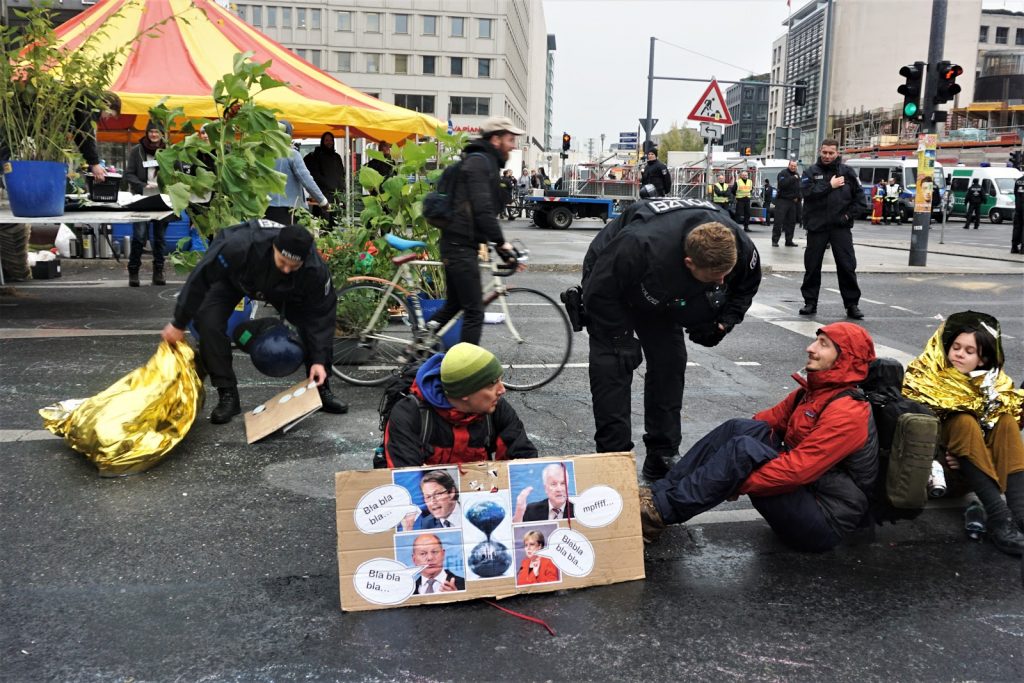
These worries are not only shared by the young generation but also by the generations before them. Sipping on warm tea provided by the camp volunteers, Ulrike and Jens stand under the colourfully foliated trees on the edge of the climate camp. “The first thing that comes to my mind as a horror scenario is that the people who are where the climate catastrophe hits harder than by us lose their home, and that they then come here and we don’t really have any capacity left”, says Ulrike. “And I realise that here in the north, where it is still fertile at the moment, people already don’t want to take in those who arrive anymore and racism and xenophobia are getting worse.”
It seems to be hard to imagine a future standing in the October sun while all around people are chatting, laughing, as they participate in workshops, queue for warm soup and busily carry around colourful flags and banners. But once one listens to what they talk about, reads their banners and pays attention to the topics of the workshop – once one remembers why they are here, it is less unimaginable. “I am of course scared that as a consequence [of the catastrophe we are headed towards] there will be further destruction and more wars and conflicts”, agrees Jens. “To begin with, what already happens, is that powerful groups decide on how to deal with resources of others. That is, not share the natural resources of the world with everyone but control our destinies egotistically and capital- and profit-oriented.”
It is clear to him that if environmental degradation and climate change are not stopped, an increasing number of people will be forced to leave their homes. “I have worked for over ten years as a development aid worker in various regions of the world and I know the internal migration that already exists due to similar reasons. We know of many who must leave because they lost their basis of life.”
Citizens’ Assemblies
The activists worries and frustration, but also their hopes and ideas, do not only find expression on the streets but as well two times a day in small-scale models of the citizens’ assemblies that XR demands on a national level. During the expert talk of the citizens’ assembly on Climate Justice, Sea-Watch captain Carola Rackete and Kathrin Henneberger, co-founder of the Institute of Environmental Justice, voice some of the same concerns that are prevalent among many XR activists.
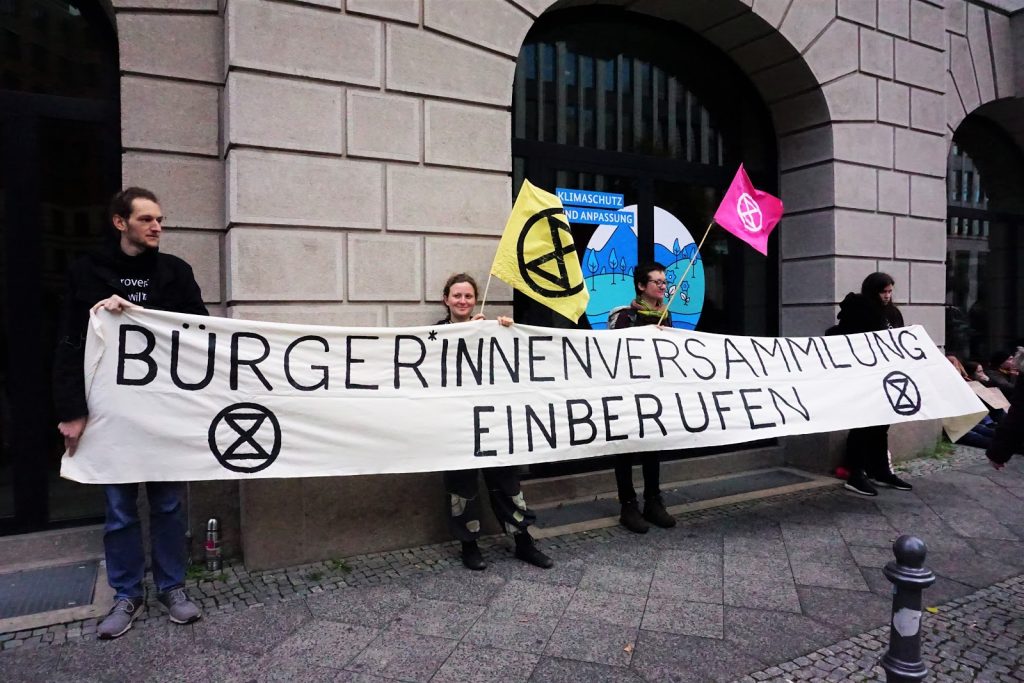
“There is a danger that the politics that already now let people drown at their borders goes even further”, Carola Rackete says in her talk on climate refugees. “The criminalisation of me and Sea-Watch is not a single case.” But apart from this criminalisation and EU policies aimed at securing borders instead of saving lives, there is another problem, she explains. The collapse of the ecosystem will lead to an increase in global poverty and eventually to ‘climate apartheid’. “There must be a legally defined protection for [climate refugees].”
Kathrin Henneberger brings up yet another issue: “The climate crisis is not a classical problem that we can solve if we regulate the economy a little bit.”. cThe effects of climate change do not affect all people equally”, she elaborates. Whereas powerful industrialised countries such as Germany where some of the biggest European sources of CO2 can be found are the main emitters of greenhouse gasses, those who are hit hardest by climate change often have little agency and decision-making power. “Especially women are often disproportionately affected”, Henneberger argues. But simply bringing in more women, not only because they are often more vulnerable but because they possess valuable skills and knowledge, won’t do the trick: “We can only solve [the climate crisis] if we fundamentally change the economic system and power structures.”
Dialogue
The effects of climate change are not bound by national borders, and neither are their causes. On October 11, a group of mostly Swedish XR activists heads towards Vattenfall’s Heizkraftwerk Reuter where some of them glue themselves to a gate in protest against the use of fossil fuels and to send a signal to the Swedish government. “Vattenfall is a state-owned company”, one of the activists explains, “thus, the Swedish government has more possibilities to regulate Vattenfall and press for a faster transition to sustainable energies than is the case with private companies.”
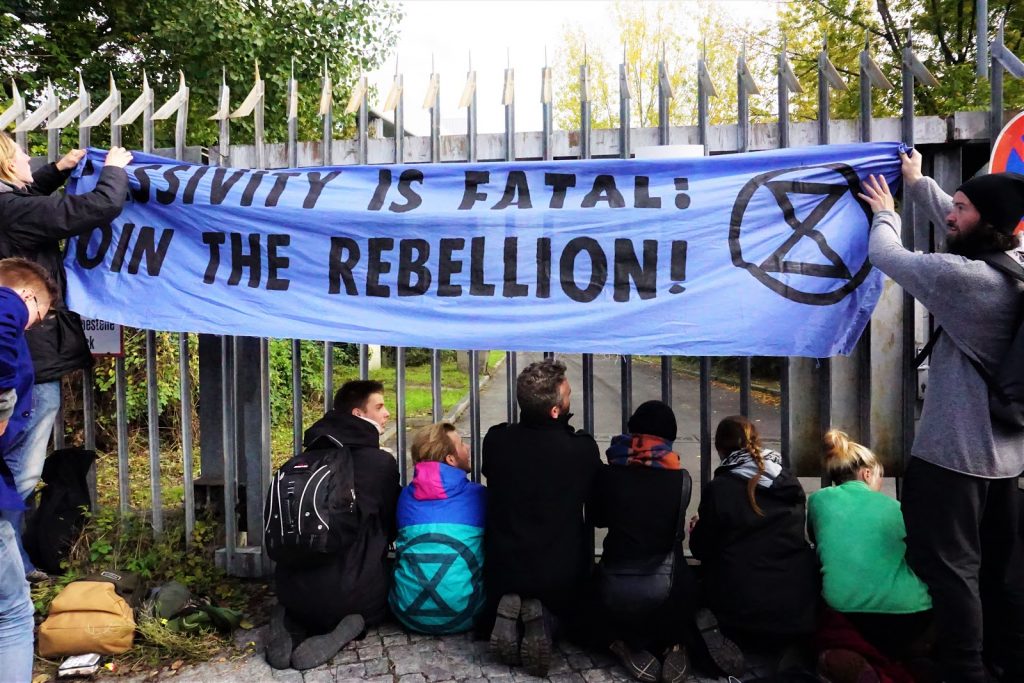
“We have already changed a lot and need to continue”, says Stefan Müller, Vattenfall’s Director Media Relations & Editorial Germany. Accroding to him, this goes beyond the question of energy production and includes issues ranging from hydrogen and electric cars to reducing the offering of meat in Vattenfall’s canteen. Some of the XR members present doubt, however, that Vattenfall is changing fast enough. Müller replies to the activists’s concern that Vattenfall’s sustainability strategy was within the framework of the Paris Agreement but also says that there can be, and might need to be, a discussion about Vattenfall’s transition.
Utopia
In light of the horrors of climate change – potential and already existing – what would be the best case scenario? “Anarchy!” replies Elsa, intentionally or unintentionally echoing a line from Irie Révoltés song Utopie. In the same song they sing: “Utopie, tu me donnes la force pour continuer” (Utopia, you give me the strength to continue). And of course, the activists of XR all have their own visions for the future that they fight for. “My best case scenario is getting out of fossil fuels now, reducing our animal agriculture by a lot, organising locally, farming locally and organically, organising in flat hierarchies and communes”, says Sasha. And when it comes to our cityscapes, Lili has a clear picture in mind: “It would be nice if everything would become much greener, if we didn’t have as many concrete buildings – and on those you can of course grow plants and make everything a bit greener that way.”
“I see the positive that I wish for in small signs, for example in social behaviour as it is fortunately lived again or rediscovered primarily by the young generation and that therein a lot of creative possibilities are created through which people can live together no matter their background, no matter their origin”, says Jens. “And that is also why I am here. Because I want to support this dream myself.” Yet, despite the presence of these small signs not all have come to the conclusion that change needs to happen. “I experience this sometimes even among my friends who are environmentally aware”, elaborates Ulrike. “When it comes to giving up certain things they somehow say ‘Nah, I want to continue living as I did until now,’ and I wish that, without a catastrophe having to happen here or that there are bans, they’d say ‘Well, I thought about it, I need to change.’”
“The best moment to stop the climate crisis was 30 years ago. The last moment is now”, Kathrin Henneberger said in her talk. “But first of all”, says Jens, “a big fight is important and will happen.” Judging based on the rapidly growing support for XR within less than a year and the activities of other environmental movements and organisations such as Fridays For Future and Ende Gelände, the fight has already begun.
XR Rebellion Week photo story: here
by Merle Emrich
Photo Credits
All photos by Merle Emrich, All Rights Reserved
